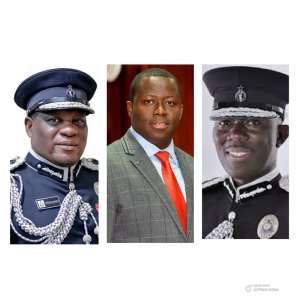The First Major Mistake in President John Mahama’s Governance

The Dismissal of Dr. Akuffo Dampare as IGP of Ghana
The appointment and subsequent removal of key figures within a government can define its legacy, and for former President John Mahama, the decision to dismiss Dr. Akuffo Dampare as Inspector General of Police (IGP) stands out as arguably one of the biggest missteps during his tenure.

Dr. Dampare’s leadership not only brought necessary reforms to the Ghana Police Service but also elevated the standards of policing in a way that many believe had not been seen before.
Dr. Akuffo Dampare assumed the role of IGP at a time when public trust in the police was wavering, plagued by accusations of corruption, inefficiency, and misconduct.
His ascendancy came with a promise of reform and accountability, and he delivered on this promise with remarkable zeal. Under his leadership, various initiatives were introduced to enhance community policing, improve relations between the police and the public, and upgrade the overall integrity of the police service.
Dampare was known for employing a blend of discipline and strategy that reinvigorated the police force.
Not only did he prioritize crime prevention and rapid response, but he also utilized data-driven approaches to tackle crime, which became a hallmark of his tenure.
His commitment to transparency and adherence to ethical standards is perhaps one of the key reasons many citizens and fellow officers regarded him as one of the best IGPs Ghana has ever had.
Misunderstanding the Role
Critics who argue that Dr. Dampare’s legacy was more about his presence on social media than policing fail to recognize the underlying functions of effective leadership. Policing is not only about being visible; it’s about fostering an environment of trust, promoting safety, and carrying out the law fairly and justly.
Dr. Dampare’s effectiveness was not solely marked by his social media presence but rather by tangible improvements in law enforcement and community safety.
This perspective is often drowned out by voices who see the police strictly as an enforcement body detached from community relations. The criticism that his focus on modern communication diluted the seriousness of policing lacks substance.
In fact, using modern tools to communicate can enhance policing, as it makes the police more accessible and fosters cooperation with the community.
To dismiss claims that Dr. Dampare raised the standards of policing as mere social media popularity contests is not only misleading but disingenuous. Those who claim that his disciplinary methods reduced morale among officers are often motivated by personal agendas and rebellions against the very accountability that Dampare instilled. Discipline, when applied judiciously, cements professionalism; it is not an adversary to morale but rather a foundation of effective policing. The transformation seen under his reign was rooted in those very principles.
IGP COP Christian Tetteh Yohuno, the successor to Dr. Dampare, began his term with a tall order.
While many hope he will continue the progressive pathway outlined by Dampare, he has yet to demonstrate results that evoke the same trust and respect.
Until we observe clear, innovative changes and a revival of community trust with his leadership, it is premature to
claim that he matches or surpasses the standards set by Dr. Dampare. The legacy of one IGP cannot simply be shuffled aside without scrutiny of the impact it continues to have on the Ghana Police Service and the community at large.
The decision to remove Dr. Akuffo Dampare from his position as IGP remains a contentious issue intertwined with questions of governance, leadership, and the role of the police in society.
As we reflect on President Mahama’s leadership and the decisions that have shaped Ghana’s police service, it is vital to recognize the contributions of those like Dr. Dampare, who have dedicated themselves to elevating the standards of law enforcement.
Rather than cast aside his achievements, we should celebrate them and advocate for a continuity of the values he espoused. Stopping the hypocrisy and acknowledging excellence in leadership is critical for the betterment of the Ghana Police Service and, indeed, for the safety and security of the nation as a whole.




